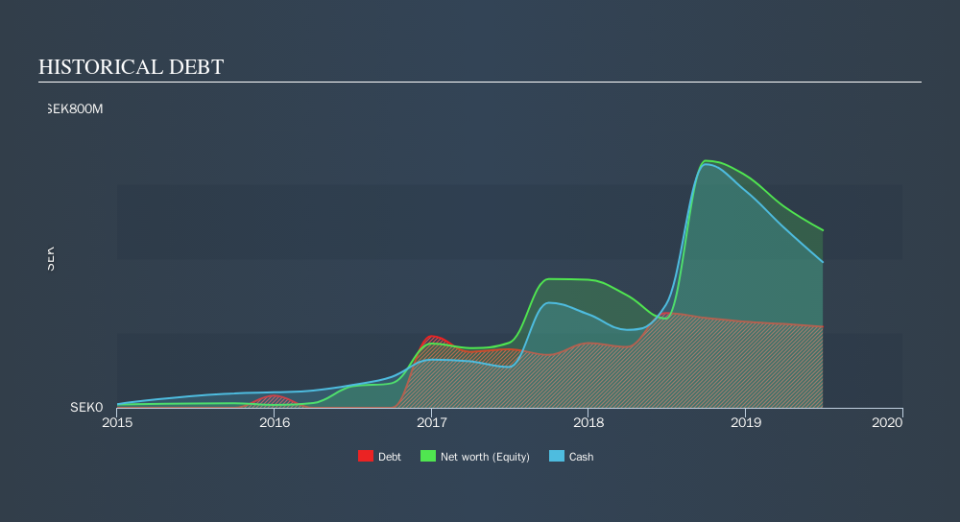Is Storytel (STO:STORY B) Using Debt In A Risky Way?

Warren Buffett famously said, 'Volatility is far from synonymous with risk.' So it seems the smart money knows that debt - which is usually involved in bankruptcies - is a very important factor, when you assess how risky a company is. As with many other companies Storytel AB (publ) (STO:STORY B) makes use of debt. But the real question is whether this debt is making the company risky.
When Is Debt Dangerous?
Debt and other liabilities become risky for a business when it cannot easily fulfill those obligations, either with free cash flow or by raising capital at an attractive price. In the worst case scenario, a company can go bankrupt if it cannot pay its creditors. However, a more common (but still painful) scenario is that it has to raise new equity capital at a low price, thus permanently diluting shareholders. Of course, the upside of debt is that it often represents cheap capital, especially when it replaces dilution in a company with the ability to reinvest at high rates of return. The first step when considering a company's debt levels is to consider its cash and debt together.
Check out our latest analysis for Storytel
How Much Debt Does Storytel Carry?
As you can see below, Storytel had kr217.5m of debt at June 2019, down from kr254.0m a year prior. However, it does have kr390.5m in cash offsetting this, leading to net cash of kr173.0m.
How Strong Is Storytel's Balance Sheet?
Zooming in on the latest balance sheet data, we can see that Storytel had liabilities of kr502.7m due within 12 months and liabilities of kr241.8m due beyond that. Offsetting these obligations, it had cash of kr390.5m as well as receivables valued at kr381.5m due within 12 months. So it can boast kr27.4m more liquid assets than total liabilities.
This state of affairs indicates that Storytel's balance sheet looks quite solid, as its total liabilities are just about equal to its liquid assets. So it's very unlikely that the kr5.98b company is short on cash, but still worth keeping an eye on the balance sheet. Simply put, the fact that Storytel has more cash than debt is arguably a good indication that it can manage its debt safely. When analysing debt levels, the balance sheet is the obvious place to start. But it is future earnings, more than anything, that will determine Storytel's ability to maintain a healthy balance sheet going forward. So if you want to see what the professionals think, you might find this free report on analyst profit forecasts to be interesting.
In the last year Storytel wasn't profitable at an EBIT level, but managed to grow its revenue by20%, to kr1.6b. With any luck the company will be able to grow its way to profitability.
So How Risky Is Storytel?
By their very nature companies that are losing money are more risky than those with a long history of profitability. And in the last year Storytel had negative earnings before interest and tax (EBIT), truth be told. Indeed, in that time it burnt through kr317m of cash and made a loss of kr252m. But at least it has kr173.0m on the balance sheet to spend on growth, near-term. Storytel's revenue growth shone bright over the last year, so it may well be in a position to turn a profit in due course. By investing before those profits, shareholders take on more risk in the hope of bigger rewards. When I consider a company to be a bit risky, I think it is responsible to check out whether insiders have been reporting any share sales. Luckily, you can click here ito see our graphic depicting Storytel insider transactions.
Of course, if you're the type of investor who prefers buying stocks without the burden of debt, then don't hesitate to discover our exclusive list of net cash growth stocks, today.
We aim to bring you long-term focused research analysis driven by fundamental data. Note that our analysis may not factor in the latest price-sensitive company announcements or qualitative material.
If you spot an error that warrants correction, please contact the editor at editorial-team@simplywallst.com. This article by Simply Wall St is general in nature. It does not constitute a recommendation to buy or sell any stock, and does not take account of your objectives, or your financial situation. Simply Wall St has no position in the stocks mentioned. Thank you for reading.

